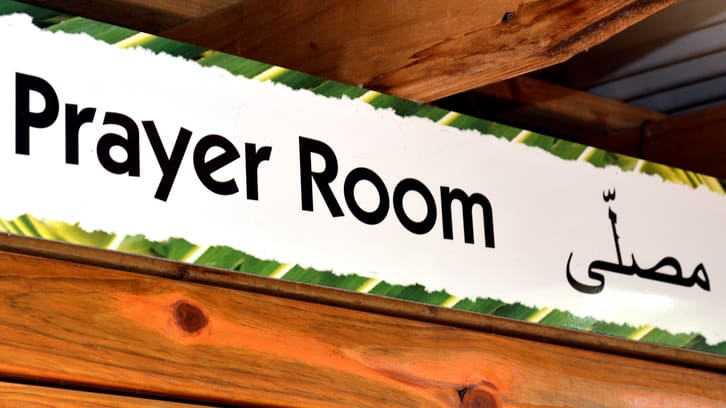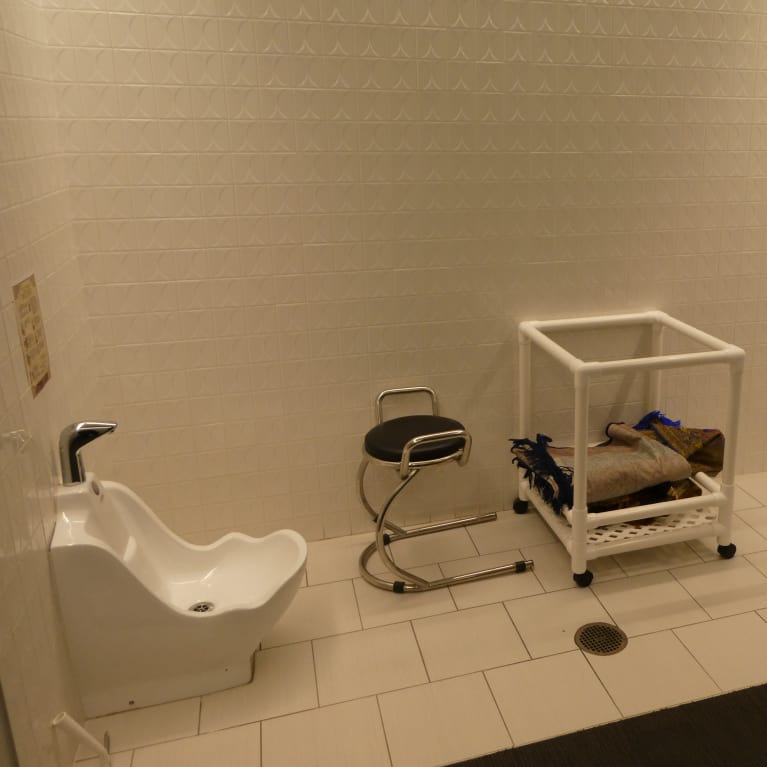
The concept of bringing your whole self to work has been around for a while. For some organizations, that means providing a place for introspection—somewhere employees may pray, meditate, reflect—regardless of their faith or absence of one.
Respite from a Busy Day
Gogo, an in-flight Internet service provider for airline passengers, sought employee input when designing prayer rooms for its offices. Today it has such rooms on each of the four floors in its Chicago headquarters. One room includes a foot-washing station that Muslim employees requested for ritual cleansing, and three rooms have a kneeling bench, according to Debbie Fangman, facilities manager. 
"We like to accommodate our employees" who represent a mix of religions, she said. About 150 of the 900 Chicago employees frequent the dedicated space to pray or meditate, or for "a quiet break, because it's a pretty fast-paced [work] environment."
Title VII of the Civil Rights Act stipulates that employers must reasonably accommodate an employee's sincerely held religious, ethical or moral beliefs or practices unless by doing so it imposes an undue hardship on the employer. Accommodation could include providing a space for prayer or reflection.
Reserving a room is encouraged, Fangman said, and a key card is required for access.
"We want [the purpose of] these rooms to be taken seriously" and for the rooms not to be used for ad hoc meetings or naps, she noted. "We've had such positive feedback."
A Meaningful Gesture
Bak USA, a manufacturer of mobile computers based in Buffalo, N.Y., created a prayer room for its 100 employees who represent 14 nationalities.
The company created the dedicated space after Eva Bak, vice president of people, began giving up her office for 15 minutes every Friday so Muslim employees could use it for prayer. It wasn't an inconvenience to her, she said, but the gesture "meant so much" to those affected employees.
It provides "that inclusion piece where people felt they could bring their 'full selves' to work," Bak said in an e-mail.
"It's well-known that diversity in teams leads to better decision-making, greater innovation and ultimately higher returns. It's good for business. But inclusion is what connects people to the business, and we believe it's one of the core reasons they stay," she said.
"We serve a diverse workforce, but more importantly, we wanted to make it an inclusive workforce where everyone feels comfortable bringing their whole selves to work. That means making strategic decisions that align us with that thinking."
An Atmosphere of Openness
Employees at Maple Holistics, a Farmingdale, N.J.-based provider of natural beauty products, use a converted boardroom to sit or kneel in prayer, according to Caleb Backe, the company's marketing manager.
The room was made available after it became apparent that many employees were leaving their work area to pray at different times of the day. HR surveyed its 40 workers to gauge how many considered themselves religious and to learn their religious affiliations. It found predominant religions of the Western world—Christianity, Islam and Judaism—were represented.
"When we saw that more than half of the office [considered themselves] religious … we [set] up a prayer room for them to use during the day," Backe said in an e-mail. "It's been a success ever since. Employees have thanked us profusely for making the effort to accommodate their spiritual views and beliefs."
He said productivity has increased, which he attributed to improved morale and an "atmosphere of openness on the floor regarding the respect of one another's religious views."
[SHRM members-only toolkit: Accommodating Religion, Belief and Spirituality in the Workplace]
Inclusive Policies
Kent Johnson, principal at Religious Diversity at Work in Dallas, recommends being sensitive when drafting company policies on rooms that are authorized for spiritual purposes. That's to avoid implying that spirituality must be compartmentalized or that it's unwelcome outside of designated areas, he explained in a SHRM Connect chat.
He noted that at Texas Instruments, where he was formerly employed, the company had designated rooms to accommodate special prayer or meditation needs of employees, "regardless of their particular faith." While the rooms were predominantly used by Muslim employees, all employees were free to use them, he said.
"Most people worldwide believe in God. For many of them, their faith is the root of their deepest personal identity," he said. "Their faith informs their work ethic, their notions of integrity and fairness, their ambitions and their hopes. Prohibiting expression of their faith is hugely counterproductive."
The Tanenbaum Center for Interreligious Understanding, a secular, nonsectarian nonprofit, recommends calling such spaces "quiet rooms" to make it clear that the space is available to those who do not consider themselves religious or spiritual. Such a space "is meaningful to employees who practice a religion requiring prayer at specific times," such as Muslims and Orthodox Jews, as well as to nonreligious employees who simply seek time to meditate or reflect," it says on its website.
It all comes down to your workplace's culture, Bak pointed out.
"How can you create the best culture that's authentic to your brand but also serves the needs of your employees?"
Was this article useful? SHRM offers thousands of tools, templates and other exclusive member benefits, including compliance updates, sample policies, HR expert advice, education discounts, a growing online member community and much more. Join/Renew Now and let SHRM help you work smarter.
Advertisement
An organization run by AI is not a futuristic concept. Such technology is already a part of many workplaces and will continue to shape the labor market and HR. Here's how employers and employees can successfully manage generative AI and other AI-powered systems.
Advertisement


